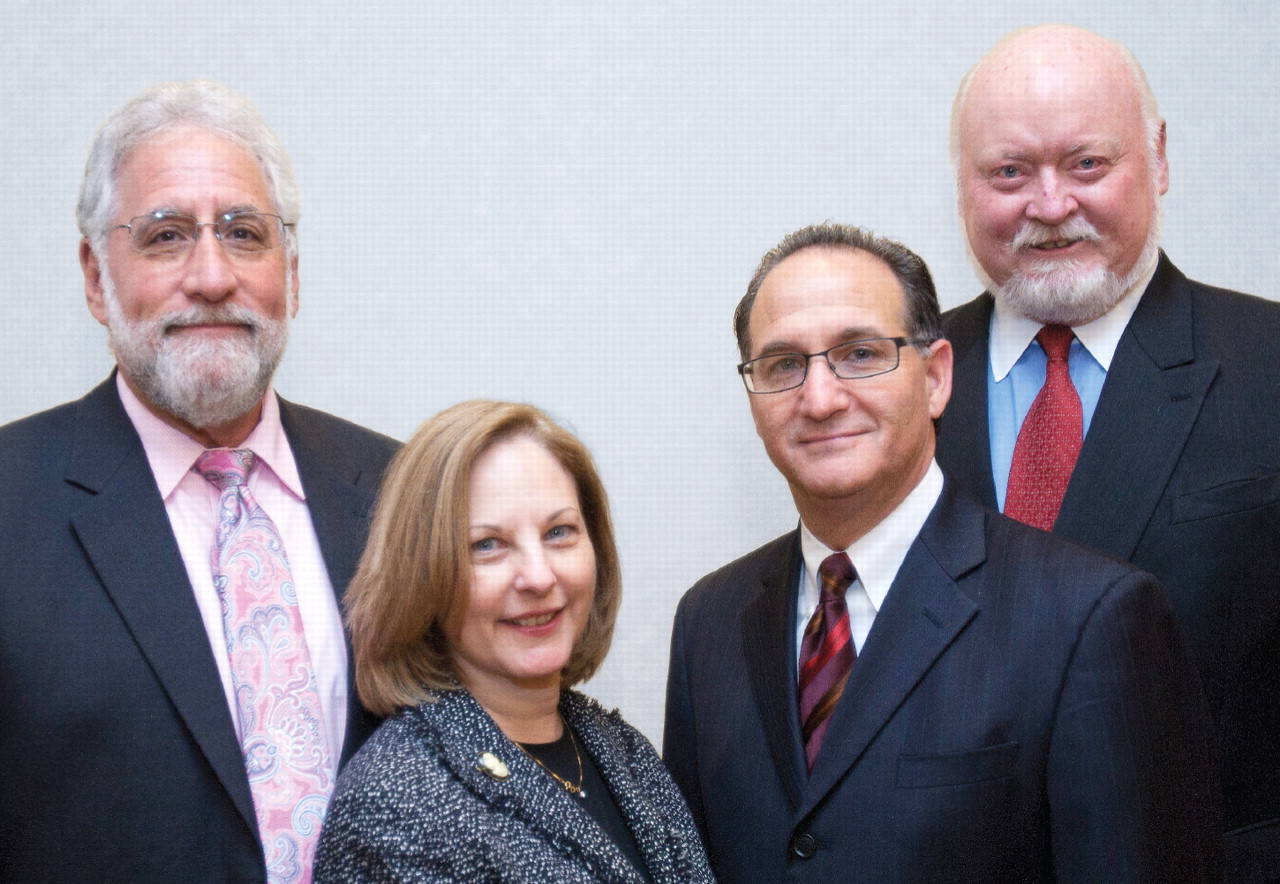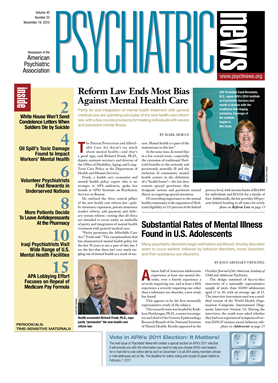The story of individuals with mental illness in jails and prisons is one that judges and judicial activists in almost every city and county in the United States can tell.
But not every city has an advocate like Miami–Dade County Court Judge Steven Leifman.
Leifman, who was the guest at the American Psychiatric Foundation's “Conversations at IPS” event during APA's Institute on Psychiatric Services last month in Boston, has made reform of the system that criminalizes mental illness a personal crusade.
He is associate administrative judge for the Criminal Division of Miami–Dade County Court, and since 2007 he has served as special advisor on criminal justice and mental health to the Florida Supreme Court. He is also a member of the American Psychiatric Foundation Board of Directors.
Leifman described the beginnings of his involvement in the issue when he promised a couple that he would help obtain treatment for their son who was mentally ill and was charged with a crime. He found, however, that because the son was not deemed a danger to himself or others, he could not involuntarily hospitalize him, and thus would not be able to keep his promise to the parents.
The experience led him on a fact-finding journey in which he learned that Dade County has “the largest percentage of people with serious mental illness of any urban area in the country”—9.1 percent. At the same time, the state was providing treatment to only 1 percent.
This situation is not different from that in many other areas in the country: jails and prisons have become de-facto psychiatric facilities.
“Dade County Jail has become the largest psychiatric facility in Florida,” said Leifman. “On any given day we have 1,200 people in the Miami-Dade County Jail on psychotropic medications. Three of the nine floors [of the county jail] are mental health floors, and because we have not done a very good job of training our law-enforcement officers to deal with this issue, since 1999 we have had 20 people with mental illness die during encounters with the police.”
He cited an internal study of the highest utilizers of psychiatric services in the criminal justice system covering the five years prior to their most recent arrest. It found that 97 individuals—75 of whom had been diagnosed with schizophrenia—had spent almost 27,000 days in jail, 3,000 days in state psychiatric hospitals, and 7,000 days in other inpatient psychiatric facilities and have had more than 2,500 emergency department visits.
“It has cost taxpayers $12.5 million, and we have absolutely nothing to show for it, while giving these individuals no hope or opportunity for recovery.”
And yet, he said, county officials have responded by looking to build more jails. “There is really something horrifically wrong with that.”
The situation is slowly beginning to draw positive action, however. Leifman said that in the last 10 years the issue of the criminalization of individuals with mental illness has garnered the attention of policymakers, and important reforms have begun in his own jurisdiction.
Nationally, he cited the 2002 “Mental Health/Criminal Justice Consensus Project Report” by the Council of State Governments as a critical turning point. And on the local level he drew attention to a 2007 report by the Florida Supreme Court titled “Constructing a Comprehensive and Competent Criminal Justice/Mental Health/Substance Treatment System: Strategies for Planning, Leadership, Financing, and Service Development.”
“We have begun to lay the groundwork to make some significant changes,” he said.
In Leifman's jurisdiction, a jail-diversion system was established in 2000 in which arrested individuals suspected of having a mental illness are assessed by a staff psychiatrist within 24 hours, and if they meet criteria for hospitalization, they are diverted to treatment.
Leifman said the program has resulted in dramatic reductions in re-arrests: the rate of recidivism for misdemeanors has dropped from 72 percent to approximately 20 percent, he said.
An especially important development, he said, has been a training program for police and the establishment of Crisis Intervention Teams (CITs), composed of uniformed police officers. The CITs respond to calls for law-enforcement assistance that may involve persons with mental illness, evaluate the situation, help to “de-escalate” any potential for violence, and transport individuals to appropriate mental health facilities for evaluation, treatment, and referrals.
“This has been one of the most remarkable cultural changes I have ever seen, because the police have embraced this issue in a way we could not have imagined,” he said. “Prior to the CIT program, in Miami the police were shooting and killing someone on the average of once a month, primarily people with mental illness. Since the program, we have had only one or two shootings in the last four years, and our police injuries have dropped to zero.”
In the arena of public opinion, Leifman said a dramatic turning point was the 15-part television news series by local CBS reporter Michelle Gillen titled “The Forgotten Floor,” which aired in 2008. The series, one part of which Leifman showed at the Boston meeting, depicted in disturbing detail the conditions of mentally ill inmates in the county jail.
Public response to the series was profound, resulting in multiple lawsuits that have moved many inmates into treatment settings. “[Gillen] did what we didn't think was possible,” he said. “She made our population sympathetic to the community.”
Leifman said reversing the criminalization of mentally ill individuals is a multifaceted effort, and he called on psychiatrists to be a part of the solution. “The reality is that none of us created this problem,” he said. “And it is going to take everyone—psychiatrists, politicians, the judiciary, law-enforcement officials—to come together to resolve it. This is a community problem and requires a community solution.”
“Conversations” is an annual event at APA's Institute on Psychiatric Services and the annual meeting sponsored by the American Psychiatric Foundation, with past speakers including Terry Bradshaw, Brooke Shields, George Stephanopoulos, and Carrie Fisher. This year's event was hosted by Fred Osher, M.D., director of the Center for Behavioral Health, Justice, and Public Policy at the University of Maryland School of Medicine.

